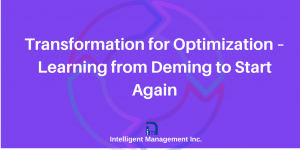
In a moment when so many businesses must learn to start again, they could not do better than build their efforts on the solid foundations of Deming’s Theory of Profound Knowledge. His credentials are impeccable: Japan was able to emerge from devastation and become an economic powerhouse by absorbing and applying his teachings after WWII.
Deming’s systemic approach to management should not be confused with any other “techniques” such as Lean and Six Sigma or Total Quality Management.
The following piece is written by our Founder, Dr. Domenico Lepore, whose career as an organizational scientist is founded on a deep study and understanding of Deming’s work.
The Theory of Profound Knowledge
The 14 points for management in industry, education and government follow naturally as application of this outside knowledge [Profound Knowledge], for transformation from the present style of Western management to one of optimization.
—W. Edwards Deming
It is very common, and, sadly, very wrong, to hear comments on Deming’s work that sound like ‘‘It’s SPC,’’ or ‘‘It’s about the 14 points.’’ Others think about it as team and teamwork. Some think of it as some sort of humanitarian stuff. The one that upset Deming the most was ‘‘It’s about TQM,’’ referring to Total Quality Management. He did not want his name to be associated with TQM, as aware as he was of the risk of ‘‘guilt by association.’’
For Deming, quality management means a commitment to the continuous improvement and innovation of products and processes. To achieve this, it is mandatory to build the organization as a clear and shared system in which interpersonal relations are not of dependence but interdependence, where communication is encouraged, and where the needs of the individual are catered to and combined with group work.
An organization determined to build Quality helps its people to understand the systemic nature of their work. It encourages the study of effects in order to discover their profound causes, and orients itself to looking at processes instead of just concentrating on results.
Deming’s vision of Quality entails a radical re-thinking of company management; it requires a purely intercultural approach, and the study of areas of knowledge that are very different from each other. Deming’s work is generally referred to as ‘‘Deming’s Philosophy.’’ Its bases are contained in the Theory of Profound Knowledge (TPK), or, in his own words, ‘‘knowledge for leadership of transformation.’’ They are:
- Appreciation for a system
- Knowledge about variation
- Theory of knowledge
- Psychology of individuals, society, and change
The application of TPK transforms the present style of Western management to one of optimization. The various elements of TPK cannot be separated; they interact with each other.
- For Deming, an organization is a system. What is a system? A network of interdependent components that work together to try to accomplish the aim of the system. Without an aim there is no system.
- Statistics (or theory of variation) will allow us to understand whether our production processes are stable (in statistical control), and what their intrinsic capacity is to supply the output required. Moreover, the understanding that variability is a phenomenon common to all human activities provides us with a conceptual basis for the correct management of staff performance and the improvement of process capacity.
- Regarding the theory of knowledge, management involves predicting and anticipating what will happen if certain actions are taken. For Deming, knowledge is prediction. A theory of knowledge explains how the combination of methods, people, environment and equipment produces a foreseen change. Knowing the system means anticipating the implications that actions taken will have on the system itself in its entirety. Knowledge can only come from theory. Information is not knowledge.
- Psychology helps us to understand people and their behavior and to appreciate their natural inclination toward learning and being innovative. The psychological aspect of the Deming approach to human resource management is radically different from current practice in Western companies. For Deming, staff performance must be managed and not evaluated a posteriori. Moreover, the malfunctioning of an organization is almost entirely due to the misunderstanding of the system by the management.
TPK is what Deming taught in the United States and Western world organizations. Quality management is for Dr. Deming the application of these principles to the management of organizations.
The work of Dr. Deming provides an exceptionally comprehensive framework for continuous improvement and draws from ever-evolving bodies of knowledge. The might of his achievements continues to deeply influence the work of Intelligent Management.
None of the partners of Intelligent Management had the privilege to talk to and learn directly from Dr. Deming. We do not claim that Deming would have agreed in full with what we have presented. For us, the major input from Deming is his intellectual courage, his zest for learning, his unending quest for knowledge. We feel that our Decalogue methodology is the offspring of his vision for ‘‘a better way.’’





LEARN MORE